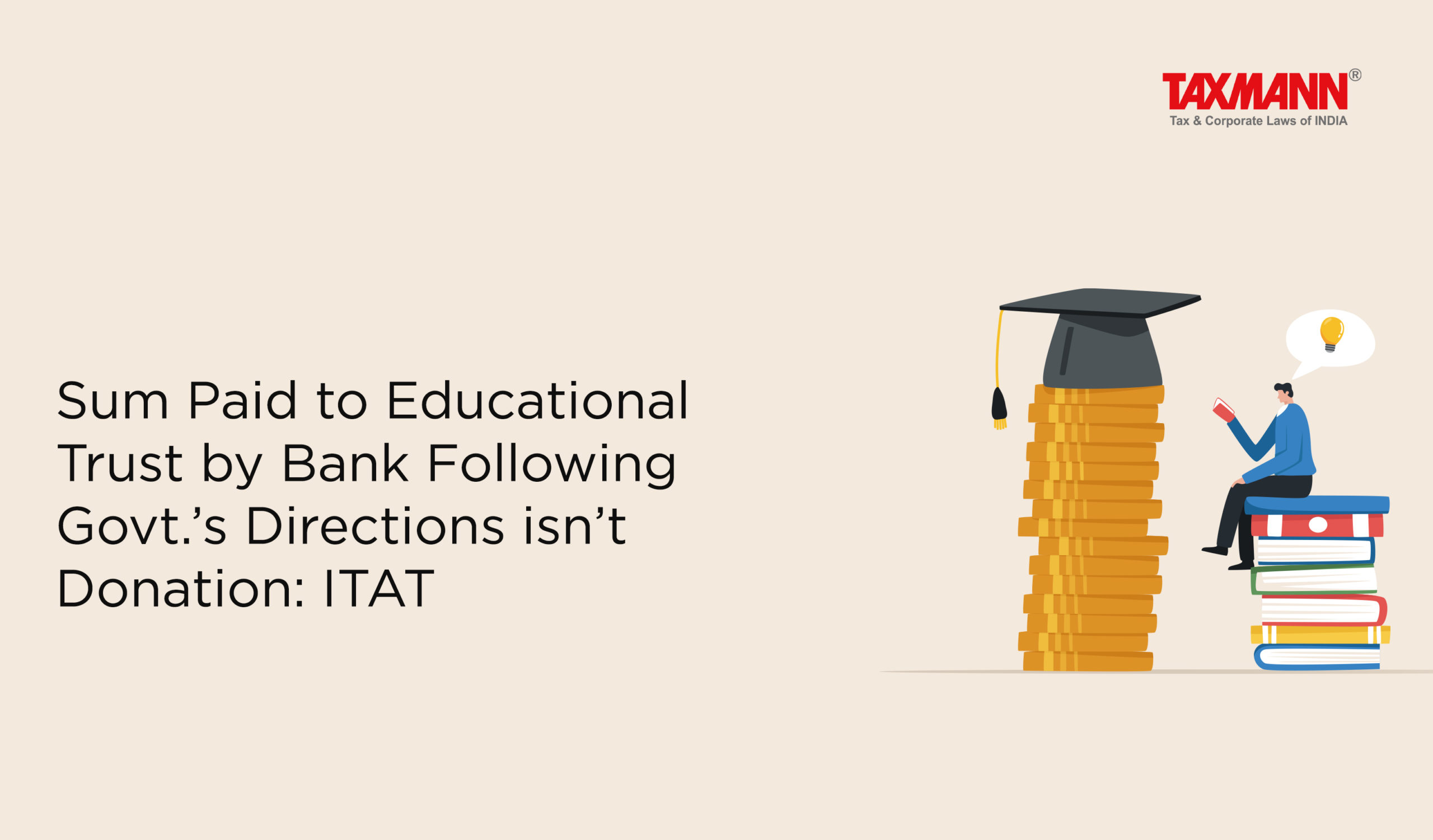Sum Paid to Educational Trust by Bank Following Govt.’s Directions isn’t Donation: ITAT
- Blog|News|Income Tax|
- 3 Min Read
- By Taxmann
- |
- Last Updated on 22 June, 2023

Case Details: Union Bank of India (Erstwhile Corporation Bank) v. DCIT - [2023] 151 taxmann.com 19 (Bangalore-Trib.)
Judiciary and Counsel Details
-
- N.V. Vasudevan, Vice President & Laxmi Prasad Sahu, Accountant Member
- S. Ananthan, CA for the Appellant.
- Gudimella V.P. Pavan Kumar, JCIT (DR) for the Respondent.
Facts of the Case
Assessee is a public sector bank governed by the Banking Regulation Act 1949 provisions. It paid a certain sum to a trust having objects to set up training centres for educating and training people to create awareness, developing local leadership among the community etc. While furnishing the return of income, the assessee claimed a deduction of the amount paid to the trust under section 37(1).
During assessment proceedings, the Assessing Officer (AO) held that those payments were not wholly and exclusively for the purpose of business and were in the nature of the donation. Thus eligible for deduction under section 80G.
On appeal, the CIT(A) upheld the order of AO. Aggrieved-assessee filed the instant appeal before Bangalore Tribunal.
ITAT Held
The Tribunal held that the trust came into existence by virtue of a deed of declaration of trust with the object of taking up developmental activities, particularly for the upliftment of the economically weaker sections of the society. Trust also played a catalyst role in the process of social economic development.
The Government of India, Ministry of Rural Development, instructed public sector banks to be lead institutions in managing and running such institutes. It was in that context that the assessee contributed such sum to trust.
The provisions of sections 37(1) and 80G are not mutually exclusive. If the contribution by the assessee is in the form of a donation, it must be of the category specified in section 80G. If it could be termed as an expenditure under section 37(1), then the right of the assessee to claim the whole of it as allowance under section 37(1) cannot be denied. However, such money must be laid out wholly or exclusively for the purpose of business.
Where the Government of India framed guidelines on corporate social responsibility for central public sector enterprises, such public sector is bound to formulate a policy in terms of the said guidelines and if an obligation springs from complying with the said guidelines, it has to be regarded as expenditure incurred on the grounds of commercial expediency.
Therefore, the expenditure satisfied the requirements of section 37(1), and thus, the deduction claimed by the assessee was to be allowed in full.
List of Cases Reviewed
-
- CIT v. Infosys Technologies Ltd. [2014] 43 taxmann.com 251/223 Taxman 469/360 ITR 714 (Kar.)
- Pr. CIT v. Eastern Coalfields Ltd. [2023] 146 taxmann.com 251/450 ITR 184 (Cal.) (para 11) followed.
List of Cases Referred to
-
- Union Bank of India, (Erstwhile Corporation Bank) v. Dy. CIT [IT Appeal No. 1109 (Bang.) of 2019, dated 15-3-2022] (para 3)
- CIT v. Infosys Technologies Ltd. [2014] 43 taxmann.com 251/223 Taxman 469/360 ITR 714 (Kar.) (para 8)
- Sassoon J. David and Co. (P.) Ltd. v. CIT [1979] 1 Taxman 485/118 ITR 261 (SC) (para 8)
- Pr. CIT v. Eastern Coalfields Ltd. [2023] 146 taxmann.com 251/450 ITR 184 (Cal.) (para 9)
- Andhra Bank v. Dy. CIT [IT Appeal No. 42 (Hyd.) of 2015, dated 24-4-2015] (para 9)
- Asstt. CIT v. Jindal Power Ltd. [2016] 70 taxmann.com 389 (Raipur – Trib.) (para 9).
Disclaimer: The content/information published on the website is only for general information of the user and shall not be construed as legal advice. While the Taxmann has exercised reasonable efforts to ensure the veracity of information/content published, Taxmann shall be under no liability in any manner whatsoever for incorrect information, if any.

Taxmann Publications has a dedicated in-house Research & Editorial Team. This team consists of a team of Chartered Accountants, Company Secretaries, and Lawyers. This team works under the guidance and supervision of editor-in-chief Mr Rakesh Bhargava.
The Research and Editorial Team is responsible for developing reliable and accurate content for the readers. The team follows the six-sigma approach to achieve the benchmark of zero error in its publications and research platforms. The team ensures that the following publication guidelines are thoroughly followed while developing the content:
- The statutory material is obtained only from the authorized and reliable sources
- All the latest developments in the judicial and legislative fields are covered
- Prepare the analytical write-ups on current, controversial, and important issues to help the readers to understand the concept and its implications
- Every content published by Taxmann is complete, accurate and lucid
- All evidence-based statements are supported with proper reference to Section, Circular No., Notification No. or citations
- The golden rules of grammar, style and consistency are thoroughly followed
- Font and size that’s easy to read and remain consistent across all imprint and digital publications are applied



 CA | CS | CMA
CA | CS | CMA
